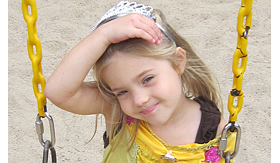Prior to admission, your child will receive a developmental screening by the program psychologist, board-certified behavior analyst or program director to ensure appropriate placement. This is a required element of our enrollment process.

For typically developing children, screening takes approximately one hour. Screening for children with an autism spectrum disorder may take up to three hours and will require parents/guardians to complete intake assessments in order to gather information to include in treatment planning. All screenings include one-on-one time with the clinician as well observation of your child in the classroom.
Skills and Abilities for Successful Inclusion
Children with Typical Development
- Responsive to adult direction
- Exhibits age appropriate communication skills
- Engages appropriately in play
- Exhibits minimal behavior challenges
- Demonstrates interest in peer interaction
If a child demonstrates delays in development at the time of screening, the clinician may make a referral for an evaluation or recommendations for treatment.
Children with or at Risk for Autism Spectrum Disorder
The Alexa’s PLAYC program is designed to support children with autism spectrum disorder (ASD) in building social and communication skills. We have carefully assessed the types of readiness skills needed for children to gain maximum benefit from our program. Skills that have been shown to predict success for children with ASD enrolled at Alexa’s PLAYC are as follows:
Toddler Program
- Nonverbal skills of at least 15-18 months of age
- Minimal behavior challenges in group setting (i.e., aggression, self-injurious behaviors, frequent temper tantrums)
- The ability to play with toys appropriately and independently for short periods of time (3-5 minutes)
- Consistent participation in parallel play with other children (does not avoid other children); active cooperative play is not required.
- Remains appropriately engaged in group activities for 5 minutes independently
Preschool Program
- Nonverbal cognitive functioning of at least 2½-3 years of age (may vary by classroom)
- Consistent use of spontaneous phrases for multiple functions including requesting, protesting, and commenting. This may include words, sign language or an augmentative communication system
- Previous involvement in treatment of any type
- Minimal behavior challenges in group setting (i.e., aggression, self-injurious behaviors and frequent temper tantrums)
- The ability to play with toys appropriately and independently for short periods of time (5-10 minutes)
- Consistent participation in parallel play with other children (is not avoidant); active cooperative play is not required
- Remains appropriately engaged in group activities for 5 minutes independently